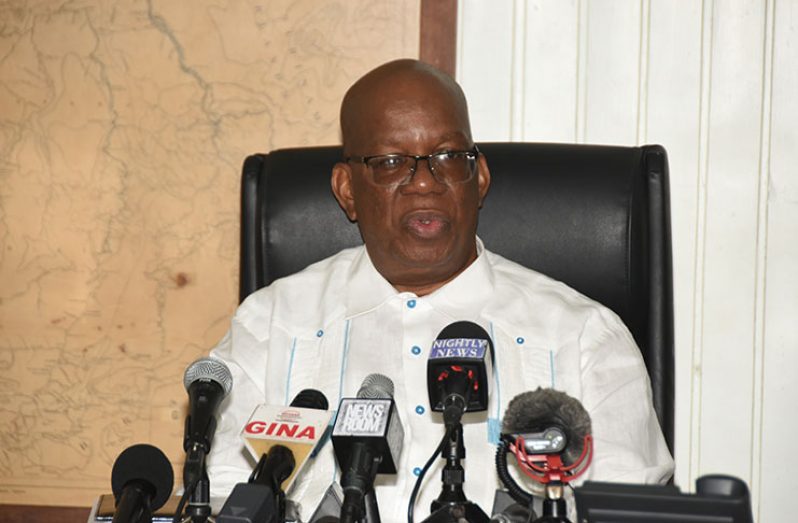…for manufacturers of clay brick, pre-fab houses
MINISTER of Finance Winston Jordan, has said that he is prepared to recommend to Cabinet that government give more incentives to those private sector individuals and entities willing to get involved in areas such as clay brick manufacturing and the production of pre-fabricated houses.
Jordan was at the time speaking at the launch of the Housing Solutions and Beyond Expo last Friday at Perseverance, East Bank Demerara.
The Finance Minister said that he is keen on seeing houses built for the local and overseas markets with Guyana’s wood, clay brick and other locally sourced materials. “I want to see maximum use of our bamboo and wood, including the shavings and our coconut, being used, and if memory serves me well, I believe that the Institute of Applied Science and Technology (IAST) once experimented with producing clear toilet bowl and wash hand sinks.
Indeed, I seem to recall that a local private sector entity which had benefited from loans from the now defunct Guyana Agricultural Development Bank (GAIBANK) had actually developed a bathroom tub, and a range of bathroom furniture made out of PVC material,” he stated,
All of this, Minister Jordan explained, add value, provide employment and reduce demand for foreign currency. “Guyana once exported clay brick and prefab houses to our sister CARICOM territories,” he reminded. “We have the knowledge, we have the skills and we have the raw materials, so let us get back into that groove,” he urged. The minister expressed his views as he spoke at the launch of the government’s “Housing Solutions 2017 and Beyond,” programme on Friday at Perseverance on the East Bank of Demerara (EBD.)
He further called for the launch of the government’s housing programme to be the start of, “A Buy Guyana Campaign,” similar to that being promoted by United States President Donald Trump to “Buy American.” If I had Trump-like powers, I would immediately sign an executive order to enforce such a campaign, wherever the treasury money was involved,” the minister said.
Additionally, Minister Jordan said that he was completely in sync with Minister of Natural Resources Raphael Trotman’s call to restrict the importation of pine wood, pine doors, sheet rocks, clay brick tiles and all those other building materials that compete unfairly with locally produced building materials. “I was in Thailand twice where I saw the use being made of bamboo, and coconut. Indeed, I slept on a bed at a top-class hotel, the frame of which was made of bamboo and in Norway, I bought a decorative chandelier that was made of wood shavings…it was a powerful example of what use can be made of wood, and we have all kinds of wood here, where that can happen,” the minister said.
The minister also reiterated that he is willing to remove the 14 per cent Value Added Tax (VAT) on forestry products, if evidence can be provided to show that the tax was hurting the lumber industry.
The minister explained that representation was made to him by the private sector that the “VAT was killing the industry.” The minister expressed the view however, that he did not believe that the industry was being killed. “If it was killed, it was a long time ago, when we allowed pine and sheet rock to come in at undervalued prices and we allowed it to knock out our own fledgling industry, but they have said that this VAT is killing them, so I said bring the evidence and if it is, not only will we remove the VAT, but we will give further incentives so that the lumber industry can grow and be competitive in Guyana,” the minister said.
He explained that government will give further incentives to the industry, because unlike the previous administration, “we want significant resources in the building of houses to emanate from Guyana.We do have those resources, and we showed it in the 70s and 80s when houses were being built in Guyana, and most of the materials came from Guyana, unlike what happened up to May 2015 when almost all of the resources were being imported,” the minister said. Since the addition of the tax, the Forest Products Association (FPA), among other private sector advocacy bodies whose members include some of the country’s biggest loggers, have expressed alarm over what they describe as an imposition of the VAT on local products.
The loggers have since appealed to the government to remove the VAT on the grounds that it will have a number of crippling and negative impacts, including making the products uncompetitive and leading to a virtual shutdown of the sector, mass unemployment, particularly in Amerindian communities and of other persons living in the interior.
They had also claimed that the VAT introduction will see a reduction in production and export earnings leading to a foreign currency shortfall. Recently, Prime Minister Moses Nagamootoo had explained that following the public outcry that the government will be reviewing a number of the taxation measures implemented this year, towards reaching solutions that would benefit both the people and the administration. The prime minister however, had advised that a decision on these would not be forthcoming this year. Forest products that have since February 1, 2017 begun attracting VAT include, logs, shingles, staves, lumber (rough and dressed), piles, poles, posts, spars, veneer, plywood, charcoal, firewood, wattles and the manicole palm.













